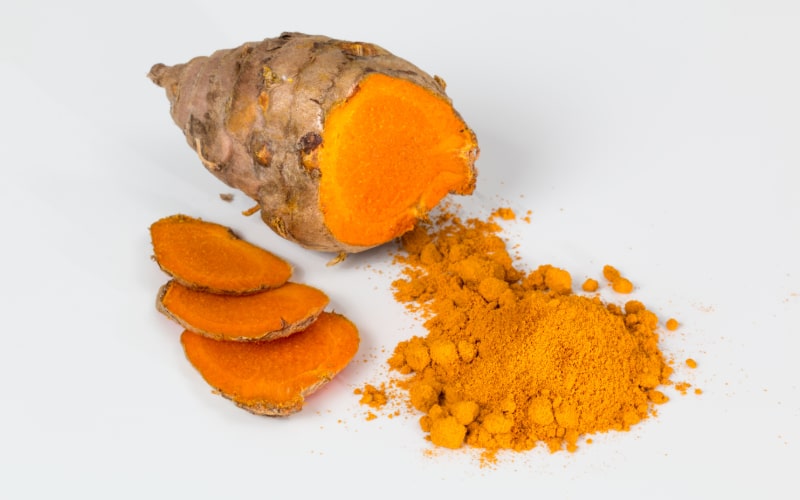Headlines
Turmeric vs Curcumin: the difference between turmeric and curcumin
22 July 2021
If you’re considering taking a turmeric supplement, you may have noticed the term curcumin mentioned frequently. But it isn’t always clear what the differences between these two substances are, if indeed there are any differences at all.
People often use turmeric and curcumin interchangeably and talk about them as though they are the same thing. However, there are significant differences to be aware of.
Curcumin is actually an extract of turmeric, and there are significant physical, chemical, and efficacy differences between the two.
Here, we explain the difference between turmeric and curcumin.
Turmeric contains many medicinal compounds called curcuminoids, the most beneficial and sought after of which is curcumin – the key active ingredient[1].
Not only does curcumin give turmeric its characteristic yellow colour, but it also has its own range of health benefits that include antibacterial, anti-inflammatory and antioxidant properties[2].
Turmeric and curcumin also differ in terms of their solubility, as well as the health benefits they can offer. Although they both offer similar benefits, to understand if turmeric or curcumin are right for you, it’s important to know the key differences in each, as well as how they can assist with your personal health concerns.
Some of the other key health concerns that turmeric is commonly used to treat are:
Studies have found that curcumin can aid in blocking the inflammatory molecules within the human body, providing relief for sufferers of conditions such as rheumatoid arthritis and inflammatory bowel disease.
Some of the most distinctive benefits of curcumin are:
Curcumin is typically a good choice as it is widely recognised as offering powerful health benefits, including natural anti-inflammatory properties. After all, it is the most sought after active ingredient in turmeric.
However, it’s important to note that most curcumin supplements offer low bioavailability. With this in mind, it's vital to research your chosen supplement to ensure it has been clinically tested and also offers a high absorption rate.

[1] https://www.everydayhealth.com/diet-nutrition/turmeric-vs-curcumin-which-supplement-should-you-take/
[2] https://www.everydayhealth.com/diet-nutrition/diet/scientific-health-benefits-turmeric-curcumin/
[3] https://www.medicalnewstoday.com/articles/306981
[4] https://www.healthline.com/nutrition/turmeric-vs-curcumin
[5] https://www.healthline.com/nutrition/top-10-evidence-based-health-benefits-of-turmeric#1.-Turmeric-contains-bioactive-compounds-with-medicinal-properties
[6] https://www.healthline.com/nutrition/top-10-evidence-based-health-benefits-of-turmeric
[7] https://www.ncbi.nlm.nih.gov/pmc/articles/PMC5310664/#:~:text=In%20healthy%20middle%2Daged%20and%20older%20adults%2C%2012%20weeks%20of,improving%20conduit%20artery%20endothelial%20function.
[8] https://www.ncbi.nlm.nih.gov/pmc/articles/PMC6835707/
[9] https://pubmed.ncbi.nlm.nih.gov/20657536/
[10] https://pubmed.ncbi.nlm.nih.gov/23832433/
[11] https://www.webmd.com/diet/health-benefits-curcumin#1
People often use turmeric and curcumin interchangeably and talk about them as though they are the same thing. However, there are significant differences to be aware of.
Curcumin is actually an extract of turmeric, and there are significant physical, chemical, and efficacy differences between the two.
Here, we explain the difference between turmeric and curcumin.
What are turmeric and curcumin?
Turmeric is an ancient golden spice, traditionally used throughout Asia for thousands of years in cuisine and medical practices. In recent years, it has been introduced to the west as a powerful superfood, with an impressive range of health benefits including significant benefits for both the body and brain, including boosting cardiovascular health.Turmeric contains many medicinal compounds called curcuminoids, the most beneficial and sought after of which is curcumin – the key active ingredient[1].
Not only does curcumin give turmeric its characteristic yellow colour, but it also has its own range of health benefits that include antibacterial, anti-inflammatory and antioxidant properties[2].
Turmeric and curcumin also differ in terms of their solubility, as well as the health benefits they can offer. Although they both offer similar benefits, to understand if turmeric or curcumin are right for you, it’s important to know the key differences in each, as well as how they can assist with your personal health concerns.
Some of the other key health concerns that turmeric is commonly used to treat are:
- Easing the symptoms of hay fever
- Treatment of depression
- Lowering cholesterol
- Pain and inflammation
- Osteoarthritis
- Itching
- Inflammatory bowel disease
- Stress[3]
Studies have found that curcumin can aid in blocking the inflammatory molecules within the human body, providing relief for sufferers of conditions such as rheumatoid arthritis and inflammatory bowel disease.
Some of the most distinctive benefits of curcumin are:
- Natural anti-inflammatory properties[5]
- Has been linked to increased brain function and lowering the risk of brain diseases[6]
- Improves the lining of blood vessels and can help stop heart disease[7]
- Can help prevent cancer[8]
- Eases the symptoms of arthritis and other inflammatory issues[9]
- Can be used to help treat depression[10]
Shared benefits
Many of the medicinal properties of both turmeric and curcumin have shared benefits, backed by scientific research, and can be used to treat a range of problem areas such as:- Osteoarthritis
- Obesity
- Antifungal
- Antibacterial
- Heart disease
- Diabetes
- Cancer[11]
Which to choose
Choosing either turmeric or curcumin as a supplement is dependent on your specific health concerns.Curcumin is typically a good choice as it is widely recognised as offering powerful health benefits, including natural anti-inflammatory properties. After all, it is the most sought after active ingredient in turmeric.
However, it’s important to note that most curcumin supplements offer low bioavailability. With this in mind, it's vital to research your chosen supplement to ensure it has been clinically tested and also offers a high absorption rate.

Find out more
Discover more about curcumin, turmeric, and Cortiba Health’s groundbreaking patented technology here.[1] https://www.everydayhealth.com/diet-nutrition/turmeric-vs-curcumin-which-supplement-should-you-take/
[2] https://www.everydayhealth.com/diet-nutrition/diet/scientific-health-benefits-turmeric-curcumin/
[3] https://www.medicalnewstoday.com/articles/306981
[4] https://www.healthline.com/nutrition/turmeric-vs-curcumin
[5] https://www.healthline.com/nutrition/top-10-evidence-based-health-benefits-of-turmeric#1.-Turmeric-contains-bioactive-compounds-with-medicinal-properties
[6] https://www.healthline.com/nutrition/top-10-evidence-based-health-benefits-of-turmeric
[7] https://www.ncbi.nlm.nih.gov/pmc/articles/PMC5310664/#:~:text=In%20healthy%20middle%2Daged%20and%20older%20adults%2C%2012%20weeks%20of,improving%20conduit%20artery%20endothelial%20function.
[8] https://www.ncbi.nlm.nih.gov/pmc/articles/PMC6835707/
[9] https://pubmed.ncbi.nlm.nih.gov/20657536/
[10] https://pubmed.ncbi.nlm.nih.gov/23832433/
[11] https://www.webmd.com/diet/health-benefits-curcumin#1



